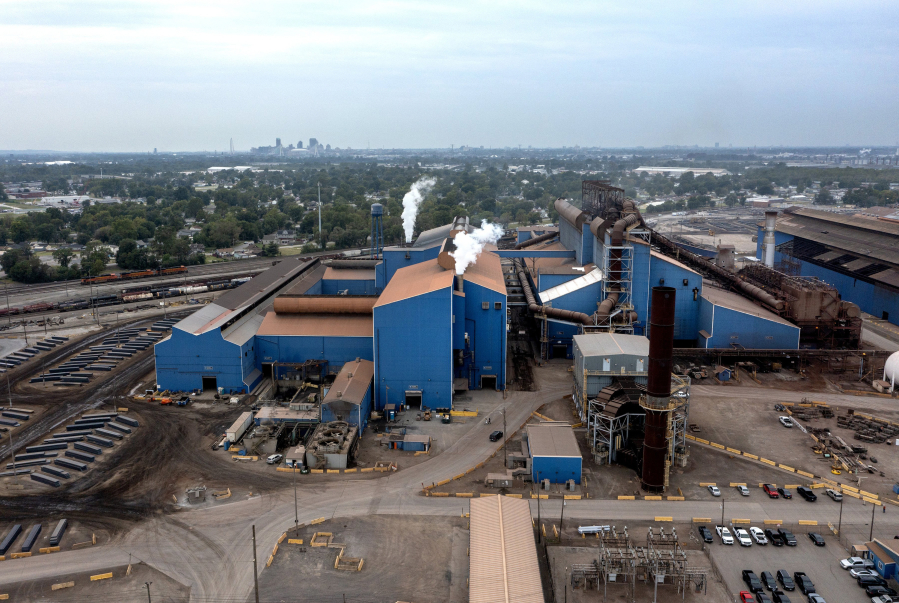GRANITE CITY, Ill. — The mayor and the local union president received phone calls early Monday morning, around the same time news releases were circulated to news outlets.
U.S. Steel had made a $14.1 billion decision. After nearly five months of reviewing bids, the Pittsburgh-based company planned to sell to Nippon Steel Corp., the Tokyo-based behemoth of the industry.
It was the latest development in what has been a tumultuous two years for workers at the Granite City plant. During that time, the company has contemplated a sale of a large portion of the facility, a sale of the company and laid off hundreds.
Residents, workers and local officials wondered if Nippon would decide to reinvest in the Granite City plant or whether they would continue to see cutbacks.
But by day’s end, little was known about how the transaction will affect Granite City Works, the 128-year-old mill that has existed longer than the city itself and still employs hundreds of people.
Workers represented by the local union chapter, President Dan Simmons said Monday, are feeling uncertain.
“Even more so now than before,” he added.
“A lot of word has been passed around,” said John Fross, a 27-year-old worker from Collinsville.
Mike Vorce, who owns a music store near the steel mill in downtown Granite City, said that for residents, there has been as much psychological pain about the plant as anything. Vorce said he was born a block from the steel mill in 1953.
“If you’ve lived here all your life like I have, you’re conditioned to believe: So goes the steel mill, so goes the town.”
Last summer, U.S. Steel revealed plans to sell a portion of the facility to Chicago-based SunCoke Energy in a deal that would eliminate nearly 1,000 of 1,450 jobs at the plant.
As of earlier this month, the companies were still in discussions, and no final agreement had been announced. U.S. Steel did not respond to questions Monday about whether it was still in talks with SunCoke.
In August, U.S. Steel announced that it had received proposals from bidders looking to purchase the entire company and was considering a sale. Then, in September, U.S. Steel announced plans to temporarily idle the last operating blast furnace at the Granite City plant, which resulted in 400 layoffs.
In November, the company said the idling would continue “indefinitely” and notified 600 additional workers that layoffs were possible.
In a statement to the Post-Dispatch, U.S. Steel did not directly address how the sale might affect the Granite City plant. Nippon Steel did not respond to a request for comment Monday.
“These workers need to know that the city’s going to do anything and everything we can to get them to invest money into this plant — and to not just look at this plant as a dinosaur,” said Granite City Mayor Michael Parkinson. “We believe we make the best steel in the world.”
United Steelworkers President David McCall issued a statement Monday morning vowing to urge government regulators to scrutinize the acquisition. He said neither company had contacted the union about the deal and that he suspects Nippon may not understand the full breadth of the union’s labor contract, from the day-to-day commitments to retiree obligations.
“To say we’re disappointed in the announced deal between U.S. Steel and Nippon is an understatement, as it demonstrates the same greedy, shortsighted attitude that has guided U.S. Steel for far too long,” McCall said.
The union, which represents 11,000 U.S. Steel employees nationwide, had backed a late-summer bid from the Cleveland, Ohio-based steelmaker Cleveland-Cliffs.
U.S. Steel rejected that offer, saying Cleveland-Cliffs had pushed to reach a deal without allowing enough due diligence.
Nippon said in a statement that it will honor all collective bargaining agreements with the United Steelworkers union.
U.S. Rep. Nikki Budzinski, D-Springfield, said she’d hoped a domestic company would buy U.S. Steel and invest in the Granite City plant. The “news of a foreign acquisition falls short of those hopes and leaves the future of this critical plant in jeopardy,” she said in a statement.
U.S. Steel President and CEO David Burritt said in a statement that the transaction with Nippon “combines likeminded steel companies with an unwavering focus on safety, shared goals, values and strategies underpinned by rich histories.”
The companies said U.S. Steel will continue to operate under its brand name and will keep its headquarters in Pittsburgh. The deal is expected to close in the second or third quarter of 2024.
Tokyo-based Nippon agreed to acquire U.S. Steel for $55 per share, representing a 40% premium on the company’s Friday share price — an offer that analysts viewed as generous.
“We in the market were pretty surprised,” said Phil Gibbs, a metals and aerospace equity analyst and managing director at KeyBanc Capital Markets. “Nippon clearly felt like if they didn’t go big, they weren’t going to have a shot.”
In the Granite City plant’s favor, Gibbs said, the facility is well-situated, with rail and barge access.
“It sits in a decent location,” he said. “You have a lot of potential customers in the central corridor. And there’s demand.”
And in steelworkers’ favor, he added, though jobs in the industry may shift around geographically within the U.S. in the coming years, overall, the companies still need workers.
“There’s not going to be a shortage of demand for steel employees in the country. There’s a lot going on,” Gibbs said. “There’s still a shortage of industrial workers in this country.”
Granite City doesn’t depend quite as heavily on the plant anymore, said Vorce, the music store owner. People have spread out, so not everyone who works at the plant lives in Granite City these days. The city has worked to bring in other types of businesses and has survived the losses of other manufacturers over the decades and persisted.
“I don’t think the town is as reliant on industry as it once was,” Vorce said. “We keep ticking.”



